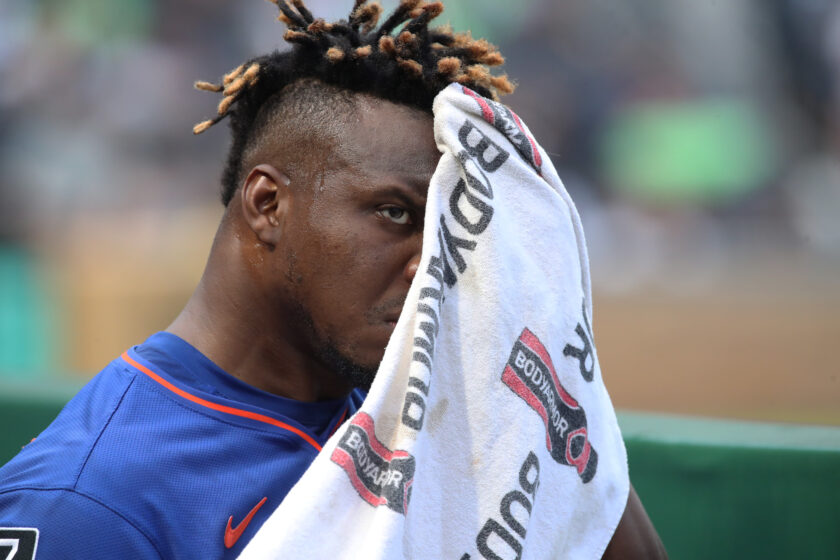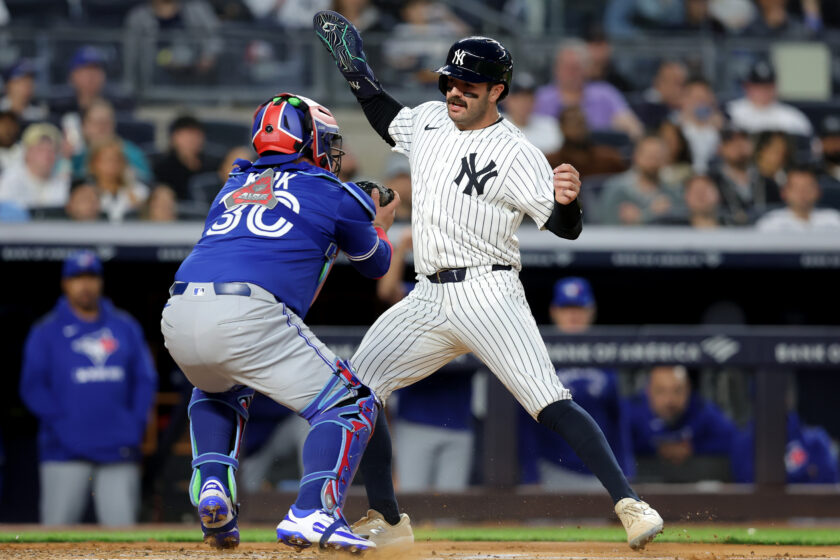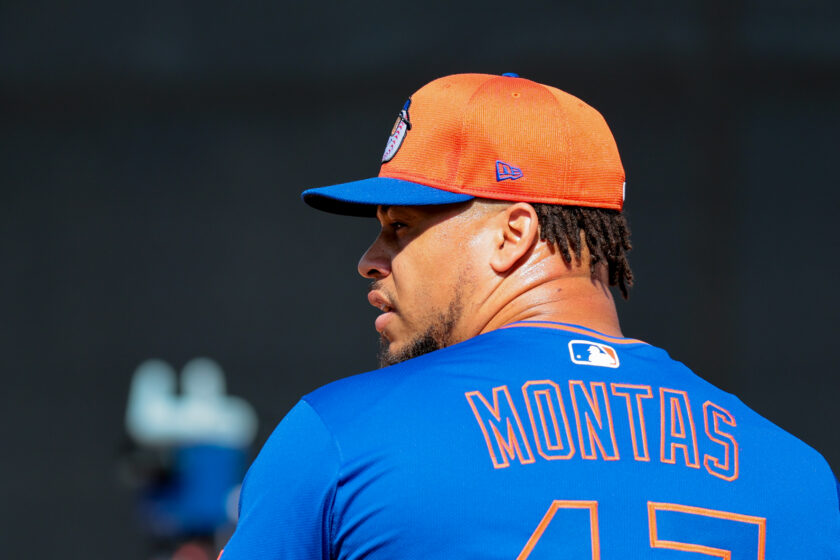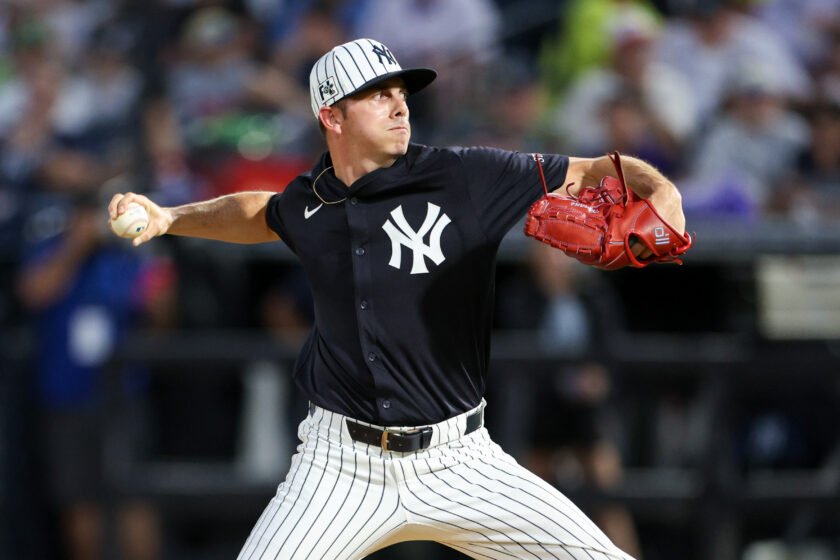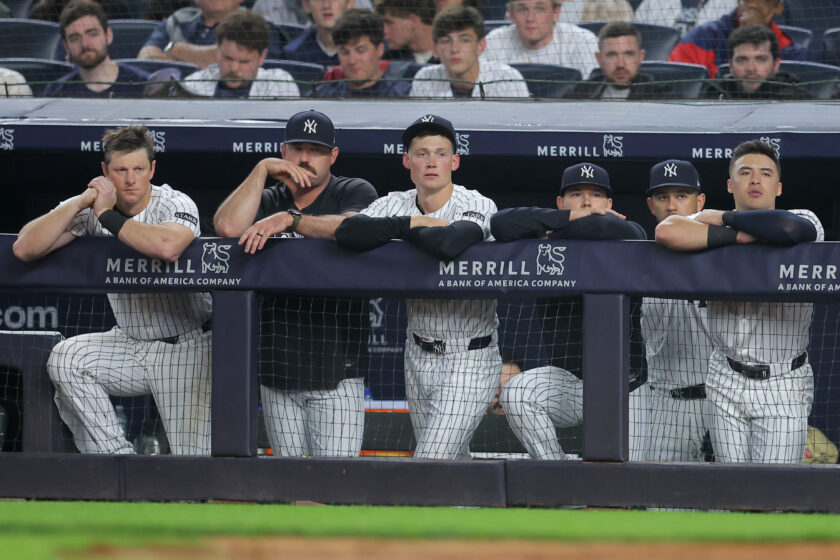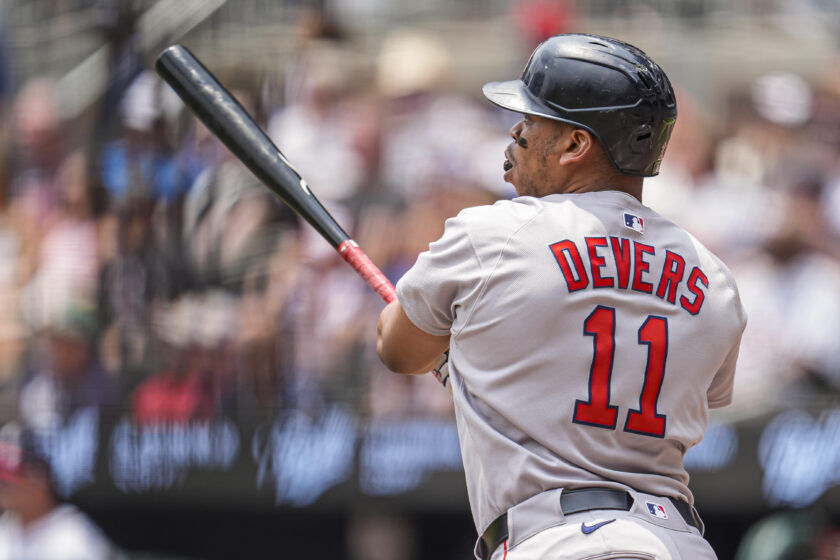The best (and worst) New York sports series finales
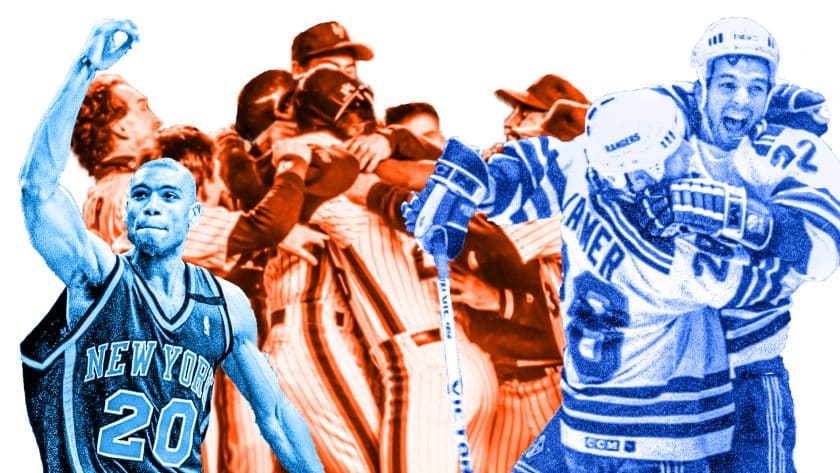
In honor of the “Game of Thrones” polarizing farewell, ESNY looks back on the best and worst series finales in New York sports history.
[sc name=”Geoff Magliocchetti Banner” ]If any argument is more tired than the greatest basketball player of all time, it’s the debate over which popular television series managed to stick the landing in its series finale.
The popular HBO series Game of Thrones wrapped up its eight-season run on Sunday night. Fan reaction to the exit, as well as the final season as a whole, has been mixed among the vocal fanbase. The middling reaction is not unlike the fan receipts on the polarizing ending to The Sopranos 12 years prior. Replies to both finales have at least fared better than the universally despised outings from fellow long-running series Seinfeld, How I Met Your Mother and Dexter. Fond farewells have been hard to come by, by many believe The Office, Breaking Bad, and Parks and Recreation found the elusive formula.
So, on a New York sports level, what have been the best, and worst, “series” finales? That conversation excludes the Giants and Jets’ single-game excursions, but there’s been plenty of farewell drama both good and bad.
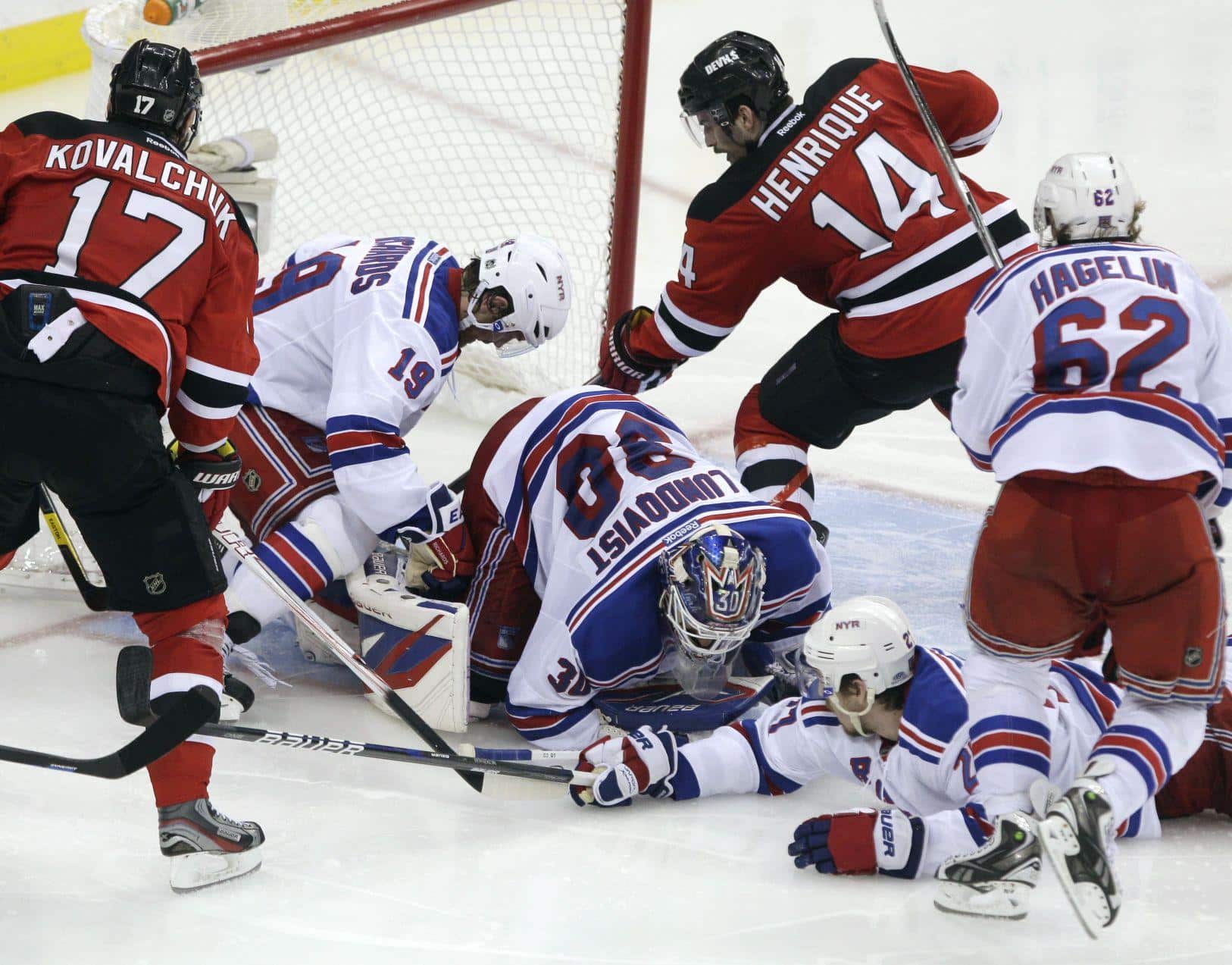
Devils Best: 2012 Eastern Conference Finals, Game 6
Recent history hasn’t been kind to the New Jersey Devils. Since 2008, they’ve earned victory in only five playoff rounds. The stretch has been all the more painful by the relative consistency of their blue rivals across the Hudson River. The most recent addition to that number nonetheless produced three words that continue to haunt New York Rangers fans: “Henrique! It’s over!”
That declaration rang across the airwaves of NBC Sports Network from Doc Emrick’s microphone after the Devils punched their ticket to the Stanley Cup Final. The advancement was made all the sweeter by topping the top-seeded Rangers in front of a raucous crowd at Prudential Center. Seeded sixth, the Devils earned their chance to clinch in Newark with a 5-3 victory in Game 5 of the series. They seemed well on their way to an easy clinch with a 2-0 lead in the Garden State-based Game 6 before the Rangers knotted things up in the second period.
The game needed overtime to finish off. The titular Adam Henrique made sure fans weren’t waiting long. His goal was scored 63 seconds into the extra session, sending Newark, and Emrick, into hysterics. The Devils would last six games in the Stanley Cup Final before falling to the Los Angeles Kings.
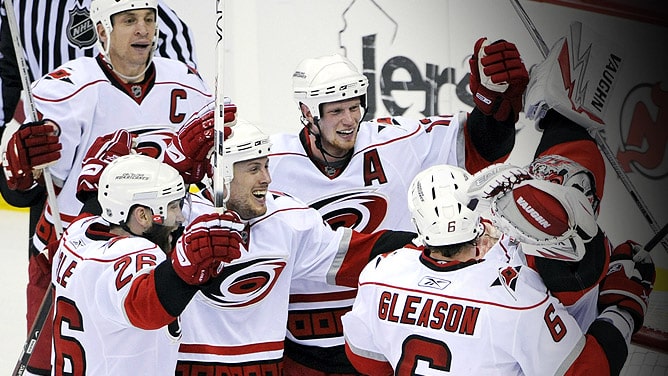
Devils Worst: 2009 Eastern Conference Quarterfinals, Game 7
The Devils and Carolina Hurricanes opened the 21st century with some hard-fought playoff meetings. Carolina won three of four get-togethers held between 2001 and 2009. The last defeat was easily the most difficult to bear.
New Jersey entered the 2009 postseason on top of the Atlantic Division for the third time in four seasons. The Hurricanes had previously dispatched the Devils in five games en route to their first Stanley Cup banner three years prior. This series lasted seven, but that was of no consolation to the Devils, who saw advancement washed away in the series’ final minutes.
The Devils were up 3-2 as Game 7 reached its penultimate minute. With Cam Ward pulled, the Hurricanes tied the game when Joni Pitkanen found a wide open Jussi Jokinen for the equalizer. Jokinen had previously tied the series with a literal last-second goal in Raleigh’s Game 4. A groaning Prudential Center crowd resigned themselves to an overtime that never came. 49 seconds after Jokinen tied, Eric Staal won it, as his fifth goal of the series went past Martin Brodeur with 32 digits left on the clock.
The Hurricanes would go on to use the subsequent momentum to upset top-seeded Boston in seven games before falling to the eventual champions from Pittsburgh in a sweep. They would not reach the playoffs again until 2019.

Islanders Best: 1980 Stanley Cup Final, Game 6
One goal set off a quadrilogy of New York Islander dominance
The first of four Stanley Cup hoists was sandwiched by overtime goals against the top-seeded Philadelphia Flyers. Philadelphia’s Spectrum home had played host to just five Flyer defeats during the 1979-80 season, but that didn’t matter to Dennis Potvin. His winner in Game 1 was the last of two goals scored and the first overtime goal scored on a power play in Stanley Cup Final history. The Islanders jumped out to a 3-1 series lead, but the Flyers got some momentum back with a 6-3 win in Game 5.
Back at Nassau Coliseum, the Flyers endured an incident that felt like a referee-concocted dish of home cooking. With the game knotted at one in the first period, officials’ failure to call Clark Gillies offsides allowed Butch Goring to find Duane Sutter for the go-ahead goal. Philadelphia argued the call, and they may have had a point. Linesman Leon Stickle admitted he blew the call after the game.
Alas, for the Flyers, instant replay had not reached hockey by then. Philadelphia did overcome the gaffe to force overtime, but a Bobby Nystrom goal just over seven minutes in opened the championship floodgates in Uniondale.
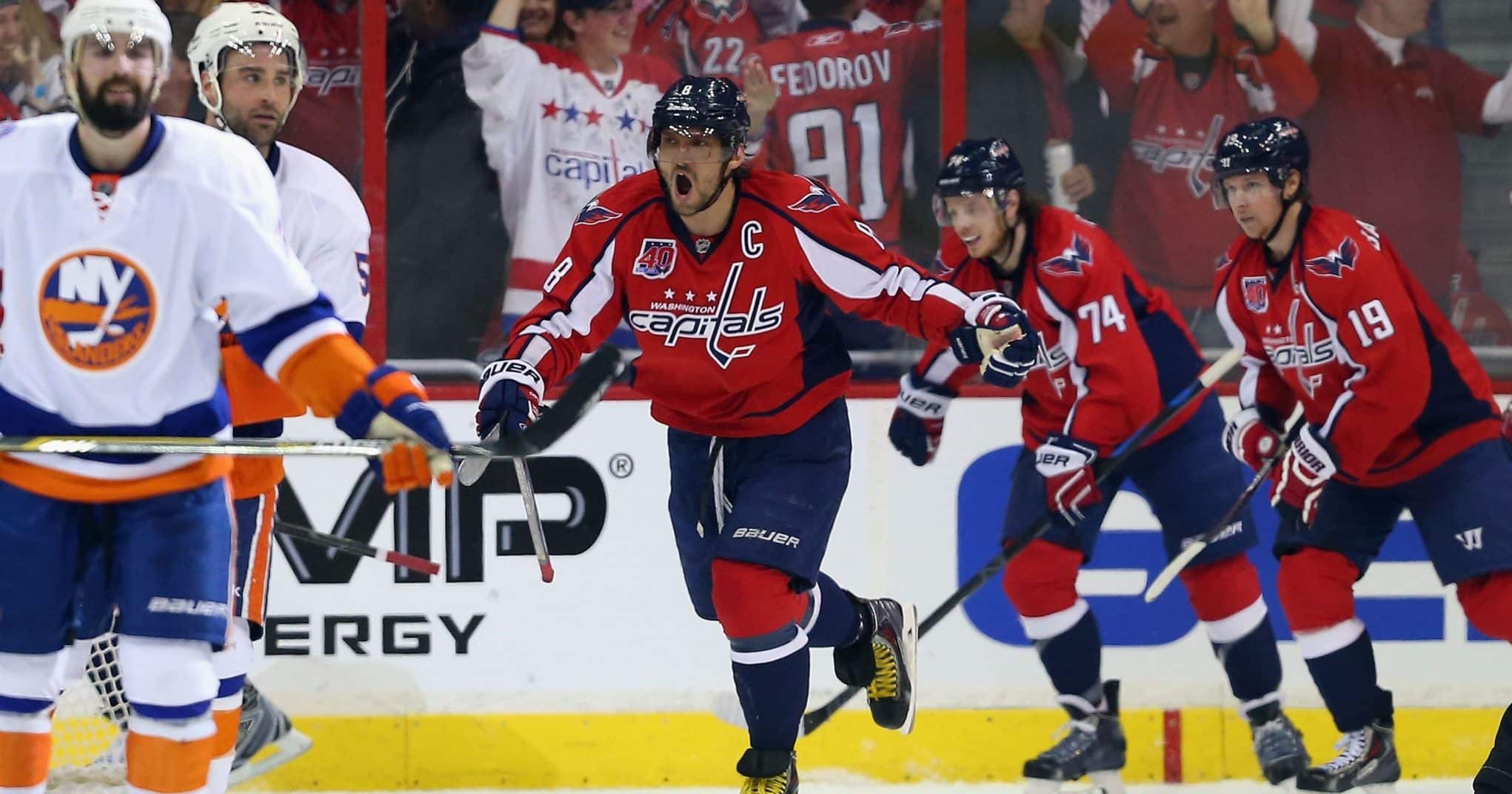
Islanders Worst: 2015 Eastern Conference Quarterfinals, Game 7
In 2015, the Islanders reached the 100-point precipice for the first time since their Cup dynasty ended in the 1984 Final. Their reward was a matchup with Alex Ovechkin and the Washington Capitals. A date with the top-seeded Rangers awaited in the Metropolitan portion of the Eastern Conference bracket. The Rangers had won the Presidents’ Trophy that season, but the Islanders had won three of the five meetings.
The Islanders gave the favored Capitals all they could over the first six games of the set. They even earned a victory in what was then seen as the last game at Nassau Coliseum, a 3-1 Game 6 triumph. The winner-take-all finale was highly anticipated, but the Islanders failed to light up the scoreboard at the worst possible time.
It was bad enough that the Islanders were only able to score one goal. Another portion of the scoreboard truly told their story, as they put up only 11 shots on Brayden Holtby in the decider. Frans Nielsen was at least able to make it interesting, as his shot, one of four in the final period for the Islanders, tied it up. But Jaroslav Halak couldn’t carry it forever. Evgeny Kuznetsov scored just after the third’s midway mark, giving the Capitals a 2-1 win.
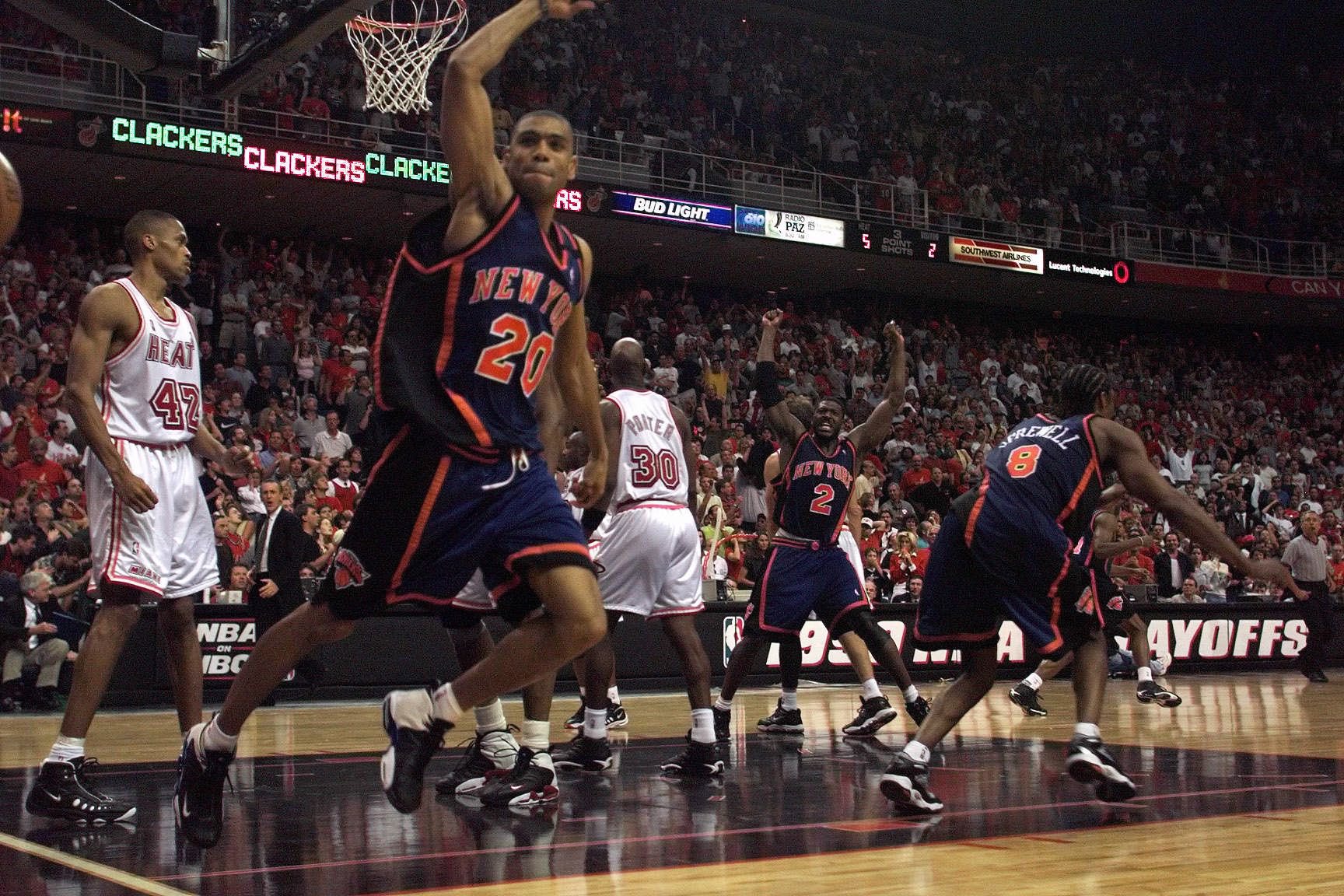
Knicks Best: 1999 Eastern Conference Quarterfinals, Game 5
It’s hard to believe the rivalry between the New York Knicks and Miami Heat has been dormant for nearly two decades. That probably makes it even more depressing that the series finale in 1999 accounts for one of the last truly great moments in Knicks history. Even so, Allan Houston’s dousing snuffed out what was probably Miami’s best chance for their late 90’s core to win a title.
A sense of awkwardness hung over the 1999 NBA Playoffs. The tournament followed up a speedy 50-game season brought upon by the 1998-99 lockout. Anticipation was still high, as the Eastern Conference was truly open upon Michael Jordan‘s retirement. The Heat appeared poised to take advantage, topping the bracket with a 33-17 mark. They would face the Knicks for the third consecutive postseason, and the two teams had split the prior matchups.
The Knicks took a 2-1 series lead, but blew a chance to win it at Madison Square Garden by dropping Game 4 by a 15-point margin. A winner-take-all finale was set up at Miami Arena.
The teams combined to shoot a combined 41 percent from the floor, but the 77-76 contest was still thrilling to the final seconds. Miami had the advantage with four remaining and seemed to be set when their pressure nearly forced the Knicks into a turnover. Four seconds was more than enough time for the veteran Houston, who floated a Charlie Ward inbounds pass over Miami defenders. After a tenuous clank, the ball swished through with eight-tenths of a second remaining. The shocked Heat were unable to reply, and the Knicks became the second eighth-seed to upset a one. They’d ride their momentum all the way to the 1999 NBA Finals against the San Antonio Spurs.
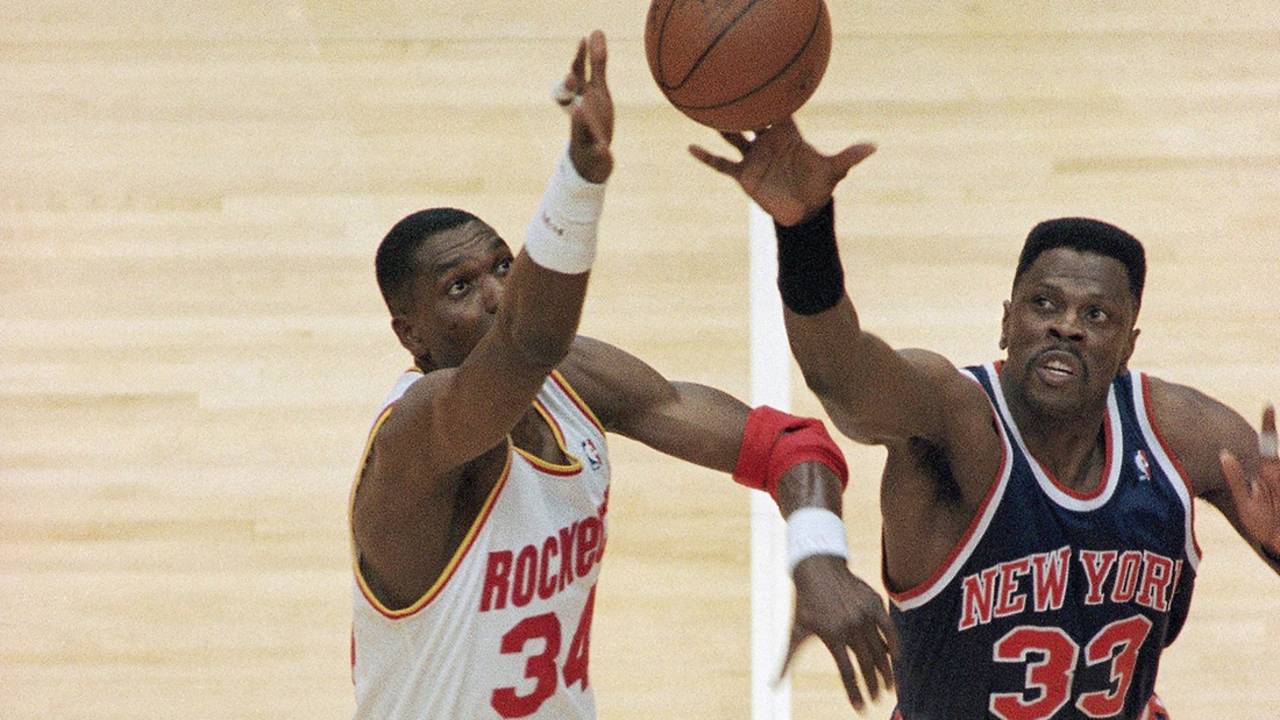
Knicks Worst: 1994 NBA Finals, Game 7
The 1994 NBA Finals still goes down as one of the greatest championship series ever played. However, the Knicks and their constituents might not see it that way.
Energized by two wins in three Madison Square Garden games, the Knicks had two chances to wrap up their first title since 1973. Had John Starks‘ triple sailed over the arms of Hakeem Olajuwon, we could’ve included Game 6 in the above category. Brushing the 86-84 loss aside, the Knicks still had a prime opportunity at The Summit to clinch eternal glory.
The tightly contested final game kept the theme of strong defense prevalent in the first six. Olajuwon’s block may have been a preview of what was to come over the final 48 minutes. The Knicks shot a ghastly 4-of-20 from three-point range. That tally included an 0-for-11 performance from Starks, who shot 2-for-18 overall. Patrick Ewing (17 points, 10 rebounds) and Charles Oakley (10 points, 14 rebounds) each did their part to keep the Knicks within striking distance, as did top scorer Derek Harper, the lone Knicks starter to keep his shooting percentage at .500 (23 points, 8-of-16).
One final dose of Olajuwon was too much to handle. The series MVP earned 25 points and 10 rebounds in the decider. Vernon Maxwell complimented with 21 points, and the Rockets took home a 90-84 victory and the first of back-to-back titles. The loss denied New York City from simultaneously hosting both the Stanley Cup and Larry O’Brien Trophy within city limits. Eight days prior, the Rangers did what the Knicks could not: end a title drought in seven games.
Liberty Best: 2004 Eastern Conference Semifinals, Game 3
The 2004 New York Liberty tied for the Eastern Conference’s best record. Their punishment for losing a Connecticut Suntiebreaker was a best-of-three series with the defending champion Detroit Shock. The first two games were double-digit splits, setting up a finale at Madison Square Garden. Each team had 64 apiece in the game’s final minute.
With the Liberty granted the final possession, everyone at MSG assumed the ball would be in the hands of top scorer and playmaker Becky Hammon. Technically speaking, they were right. Hammon drove to the paint where she met a Detroit double-team in the dying seconds. The Liberty’s leader in scoring and assists, Hammon dished the ball out to an open Bethany Donaphin. Of all the potential heroines, Donaphin perhaps had the highest odds. She was averaging less than two field goals a game and was ninth on the team in scoring with 5.0 PPG.
Hesitation was the last thing on her mind. Donaphin put up the floater over desperate Detroit arms and went down in New York glory with the winner to send the defending champions home. The Liberty advanced to the conference finals against the Sun, but fell in two games.
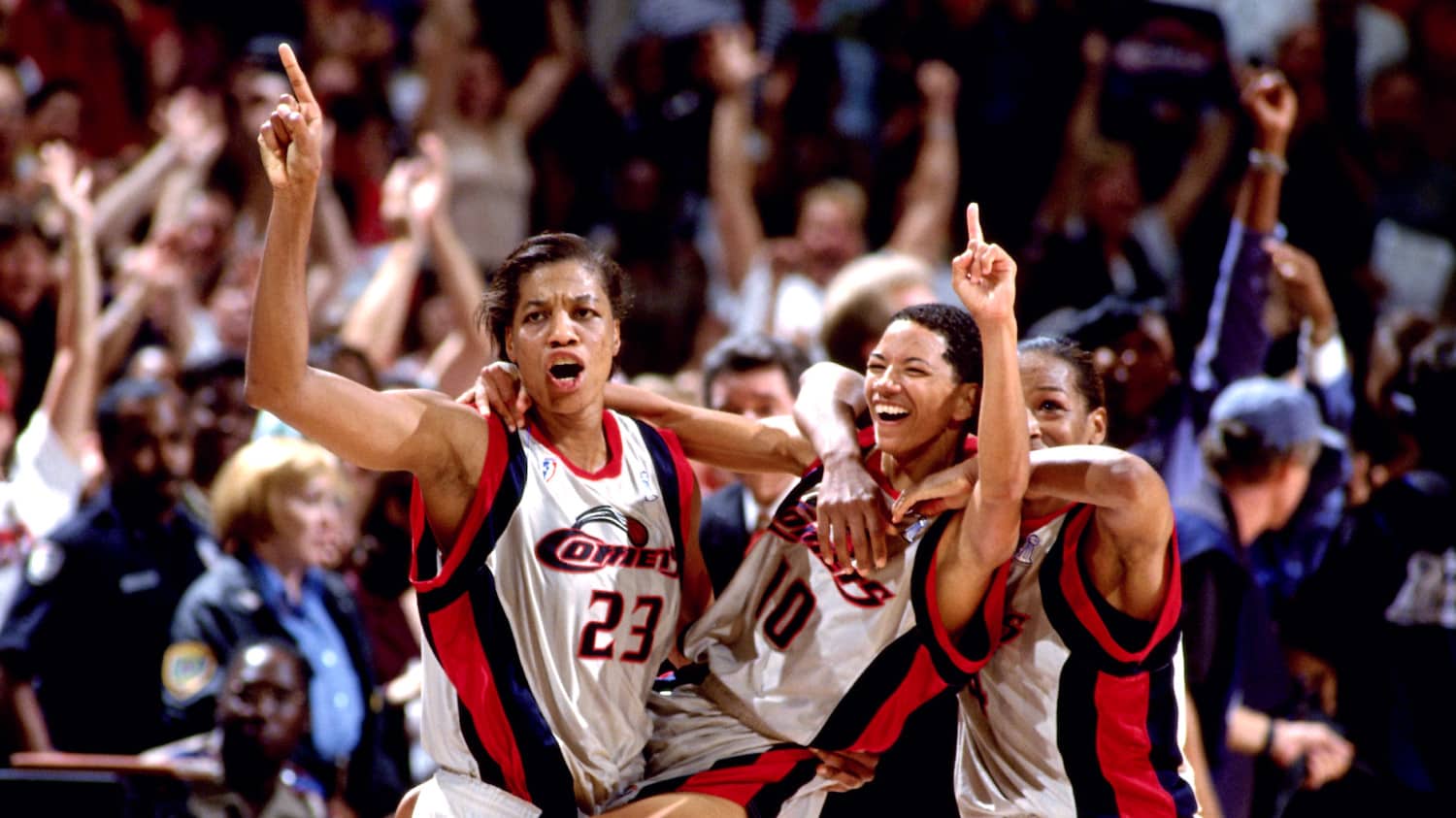
Liberty Worst: 1999 WNBA Finals, Game 3
Everyone remembers Teresa Weatherspoon‘s “shot”, but the aftermath isn’t as sweet.
In the WNBA’s first four years of existence, the Liberty met with the Houston Comets in the Finals three different times. Alas, for New York, they were no match to the Lone Star State juggernaut. The second championship meeting between the squads ended with Houston shaking off the setback with a 59-47 victory. It doomed the Liberty to a similar fate as their male counterparts five years earlier: dropping a crucial title-or-bust game at The Summit (then known as Compaq Center) thanks to a strong defensive effort by the home team.
A familiar foe made sure that Weatherspoon’s miracle only delayed inevitable in the decisive Game 3. Cynthia Cooper put the Liberty away with a game-high 24 points, earning her third Finals MVP award. In contrast, Sue Wicks led the Liberty with only 11. The Comets would earn the last of their opening four titles with a two-game sweep to open the new millennium.
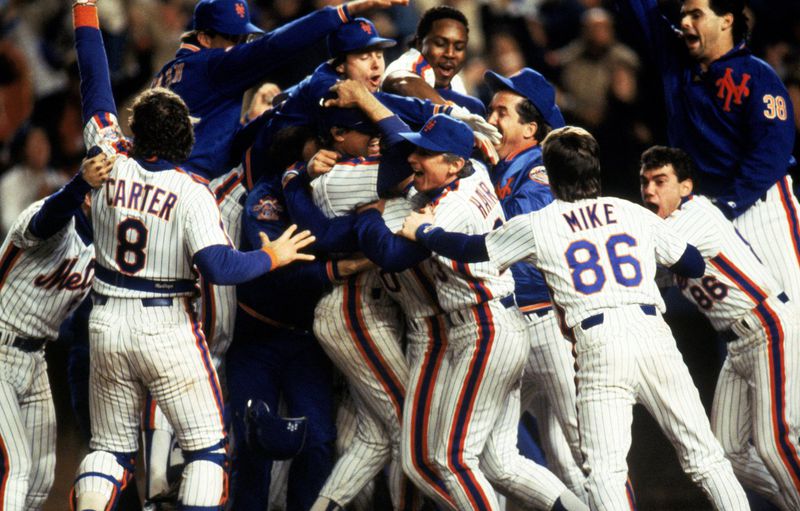
Mets Best: 1986 World Series, Game 7
With the hype, hilarity, and heartbreak of Game 6, it’s easy to forget that the New York Mets and Boston Red Sox needed a Game 7 at Shea Stadium to fully resolve their 1986 autumn conflict.
Much like the classic prior contest, the Mets needed a comeback effort. Starting pitcher Ron Darling was charged with three runs in the second inning. Dwight Evans and Rich Gedman hit back-to-back home runs to lead off and an RBI single by Wade Boggs created a 3-0 lead. As reliever Sid Fernandez held down the fort with 2.1 no-hit innings, the Mets swung momentum back to Queens via a two-run single from Keith Hernandez in the sixth frame. Gary Carter tied the game on an RBI single one pitch later.
The Mets continued the assault in their portion of the next inning. Ray Knight welcomed Boston reliever Calvin Schiraldi to Game 7 with a solo home run on his fourth pitch. Rafael Santana added an RBI single and Herandez hit an RBI sacrifice fly to make it 6-3 Mets with six outs to go. Boston narrowed the gap with a two-run double from Evans, but Jesse Orosco shut them down for the rest of the way. Orosco retired the next three batters to end the Boston chance in the penultimate inning, and the Mets used their own half to rebuild their lead through a Darryl Strawberry solo blast and an RBI single from Orosco himself. The 8-5 win secured the Mets their most recent World Series title.

Mets Worst: 2006 NLCS, Game 7
Much like Weatherspoon’s heave or Derek Jeter‘s “Mr. November” home run, a play by Endy Chavez may ultimately go down as one of the greatest New York plays that ultimately went for naught.
Forced into a seventh game at Shea against the upstart St. Louis Cardinals, the Mets’ quest for a World Series return trip was stalled a 1-1 in the top of the sixth inning. St. Louis third baseman Scott Rolen appeared to break the game open with a one-out, man-on-first blast that indeed cleared in the left field fence. However, a reaching effort by Chavez just barely kept the ball in the Shea confines. Chavez then got the ball back to the infield to throw out runner Jim Edmonds, who assumed the ball cleared Chavez’s sturdy glove.
Offensively, however, the Mets were unable to back Chavez up. They were held to two hits over eight innings, seven of which were supplied by St. Louis starter Jeff Suppan. The right hander’s efforts were eventually rewarded with a two-run Yadier Molina home run against Aaron Heilman to make it 3-1 in the ninth inning. Desperately, the Mets mustered a pair of hits and a walk against Cardinals closer Adam Wainwright. With two outs, slugger Carlos Beltran came to the plate to end a pair of droughts. The Mets had not won the Fall Classic since the aforementioned 1986. Beltran himself had accomplished much over a nine-year career, but had no World Series ring to show for it.
Wainwright needed a mere three pitches to sit Beltran down and commence the celebration. The last caught Beltran looking to ignite the St. Louis festivities. Winners of 83 games in the regular season, the Cardinals went on to win the World Series over Detroit. Beltran finally earned his ring eight years later with the Houston Astros.

Nets Best: 2002 Eastern Conference Quarterfinals, Game 5
Through the sheer postseason power of Reggie Miller, the brief glory days of the New Jersey Nets might’ve ended before they ever began.
Energized by the arrival of Jason Kidd, the Nets topped the Eastern Conference with a 52-30 record. Their first opponent was the eighth-seeded Indiana Pacers. To the surprise of many, the Pacers took Game 1 at Continental Airlines Arena 89-83. The Nets won the next two games, but a dominating Game 4 effort in Indianapolis set up what was then a deciding Game 5, as was tradition in the NBA’s first-round at the time.
The playoff prowess of Miller was well-known to the Nets’ rivals in Manhattan, but he nearly dealt the Nets a deadly dosage in East Rutherford. New Jersey seemed to have things up wrapped up, leading 96-93 with five seconds left and Richard Jefferson at the line. The rookie’s two misses gave Miller the opportunity he craved, and he sank a triple to send the game into overtime. Miller duplicated the overtime force in the fifth period, as he slammed home a dunk over several Nets defenders.
Sanity was restored in the double overtime, which was won by the Nets via a 13-2 margin. Kerry Kittles started the frame right with a three-point play, and the Nets never looked back. Miller wound up shooting 0-for-4 in the last segment. The Nets’ trek to the Finals was somewhat easier in the ensuing rounds, dispatching the Charlotte Hornets and Boston Celtics in five and six games respectively.

Nets Worst: 2004 Eastern Conference Semifinals, Game 7
The Nets’ Eastern reign unofficially ended in 2004. They unwillingly passed the baton over to the Detroit Pistons, who defeated them in a tough seven-game set.
The first four games of the semifinal matchup were decided by an average of 17 points, but Game 5 at The Palace of Auburn Hills was a triple-overtime classic. A half-court buzzer beater by Chauncey Billups ended regulation, but the Nets were energized by 16 points from fan-favorite role player Brian Scalabrine to prevail 127-120. The series victory was denied to them in East Rutherford, and the Pistons took full advantage when they took the Nets back to Michigan.
New Jersey fell behind early and never truly recovered. They permanently lost the lead through a 13-4 Detroit run late in the first quarter. The Pistons would go on to win 90-69, leading by as much as 25 as they forced the Nets into 35 percent shooting (Jason Kidd was 0-for-8). They would then top the Pacers to go to the NBA Finals, where they upset the Los Angeles Lakers in five games.
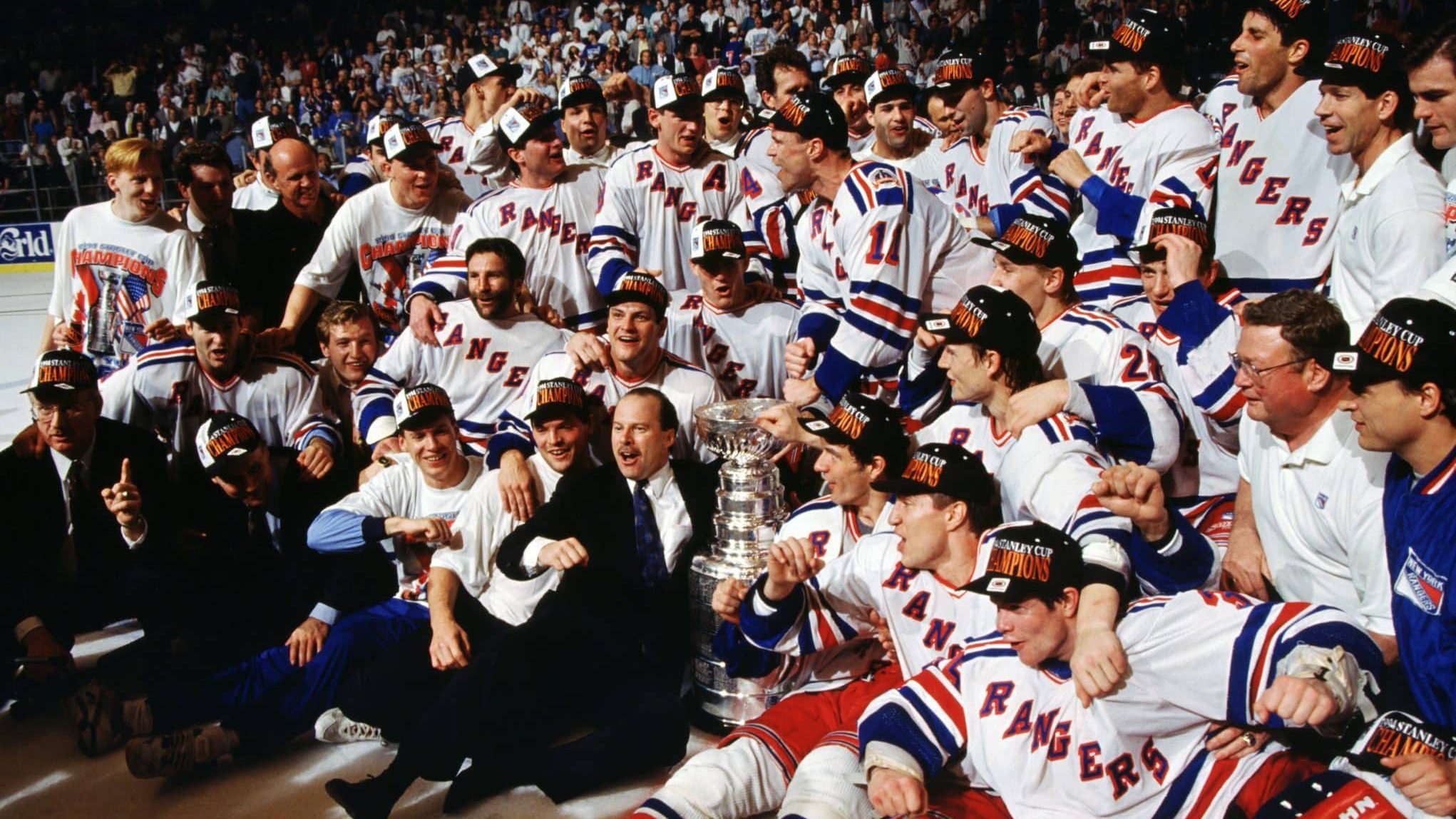
Rangers Best: 1994 Stanley Cup Final, Game 7
“The waiting is over!” “This one will last a lifetime!” “Well, New York, after 54 years, your long wait is over.”
These quotes and more defined the New York Rangers’ epic quest for a Stanley Cup banner. Skepticism was somewhat high as New York gathered as MSG for an epic evening. The Rangers had owned a 3-1 lead on the Vancouver Canucks, but their British Columbia rivals had forced a finale with two wins by a 10-4 margin. But the Rangers had waited 54 years for another chance to drink from hockey’s Holy Grail. They weren’t letting another slip past.
The Blueshirts built an early championship foundation with a 2-0 first period lead. Goals came from Brian Leetch and Adam Graves (the latter on a power play). Trevor Linden earned a shorthanded goal for the Canucks, but a goal from Mark Messier, the Captain himself, provided the necessary margin, even after Linden narrowed the gap on a power play in the third. Mike Richter shut the door with nine third period saves, and a celebration 54 years in the making was on.

Rangers Worst: 2015 Eastern Conference Finals, Game 7
Since that epic victory, the Rangers have endured a series of rebuilds and near-misses. The most egregious of the latter came in 2015.
The Rangers had captured the Presidents’ Trophy, their first since the magical Cup run in 1994. One year prior, they had come just short of a lift, falling to the Los Angeles Kings in five games (three of the four New York losses had come in overtime). To earn another chance, the Rangers took on the Tampa Bay Lightning. One year prior, the teams had collaborated on a blockbuster trade that earned the Rangers Martin St. Louis. Team captain Ryan Callahan and several premiere draft picks were sent to the Lightning in exchange.
Though Tampa had a 3-2 series lead, the Rangers seemed to pool momentum with a 7-3 win in St. Petersburg. Home-ice for Game 7, however, proved to be no advantage. The Rangers struggled to muster shots, earning only 22 throughout the game. Tampa took advantage, as Alex Killorn scored what proved to be the game-winner. Ondrej Palat added unnecessary insurance, while Ben Bishop made quick work of the little Rangers pressure in a 2-0 victory.
https://www.youtube.com/watch?v=Qguzb86ompk
Yankees Best: 2003 ALCS, Game 7
With 27 world championships under your belt, you’re bound to have some memorable clinchers. This particular victory didn’t land the New York Yankees one of those titles, but it was still a notable instance of the team’s past, present, and future collided on an epic October evening.
The Yankees had reignited their historic rivalry with the Red Sox at the turn of the century. An ALCS meeting in 1999 went just five games, but a rematch four years later proved to be more epic than the average baseball fan could handle. It all came down to one last chance in The Bronx. Boston jumped out to an early 4-0 lead, one primarily powered by home runs from Trot Nixon and Kevin Millar. Boston ace Pedro Martinez left the game with a 5-2 lead in hand, but three Yankee runs in the bottom of the eighth inning doomed New Yorkers to a late bedtime.
Aaron Boone made sure it was completely worth it.
A journeyman infielder that came to New York through a summer trade, Boone didn’t even start Game 7. Nonetheless, he was called upon to lead off the bottom of the 11th inning against Tim Wakefield. His solo shot into the left-field bleachers ended things to the tune of a 6-5 win that sent them to the 2003 World Series. Boone only a sporadic participant after the blast, sidelined by an injury suffered while playing pick-up basketball. His efforts for prolonging the Curse of the Bambino for one more year were eventually rewarded with the Yankees’ managerial job in 2017.

Yankees Worst: 2001 World Series, Game 7
With so much success comes several agonizing defeats in the annals of history. Sure, they generate little sympathy outside of city limits. But they still sting the hearts of those who wear pinstripes.
The Yankees have lost a pair of World Series in Game 7, walk-off fashion. The first was 1960 edition, that saw a 55-27 run over the advantage disappear with one swing of Bill Mazeroski‘s bat. But even more painful was the one that took place 41 years later.
Squaring off against the Arizona Diamondbacks, the Yankees were somewhat bamboozled by the alternating home-field advantage concept, as Game 7 was forced to Bank One Ballpark (now known as Chase Field). The Yankees went up 2-1, courtesy of an RBI single from Tino Martinez and a solo shot from Alfonso Soriano. Mariano Rivera was called upon for the final six outs of “regulation”, rather than his traditional three, to wrap up what would’ve been the Yankees’ fourth consecutive title.
The bottom of the eighth went by without incident. But in the ninth, Arizona broke through for two historic runs.
With one out, Tony Womack tied the game with an RBI double that scored pinch-runner Midre Cummings. As Phoenix buzzed, Craig Counsell was hit by a pitch. Luis Gonzalez made the fans erupt, as his base hit got just far enough to score Womack, giving the Diamondbacks an unlikely World Series title via a 3-2 win. It was the closest the Yankees would come to a World Series until 2009.
[sc name=”Twitter Follow Link” text=”Geoff Magliocchetti” username=”@GeoffMags5490″ ] [sc name=”Generic Link Next” link=”https://elitesportsny.com/2019/03/31/the-greatest-heroes-in-new-york-sports-history-mark-messier-friends/” text=”The Greatest Sports Heroes In New York Sports History” ]
